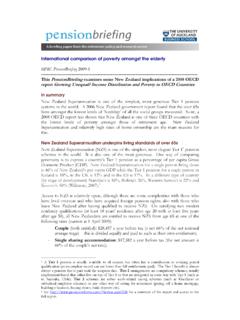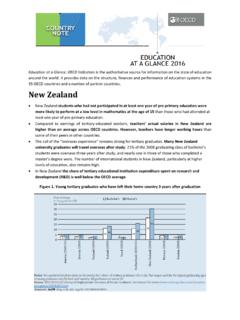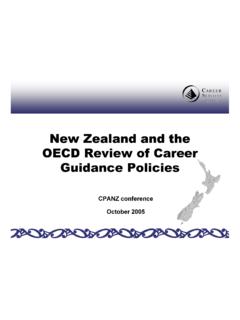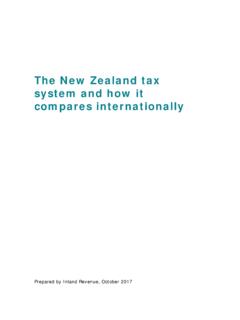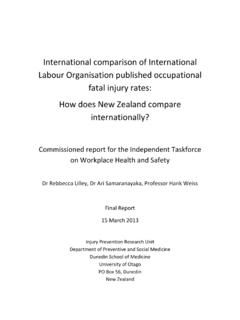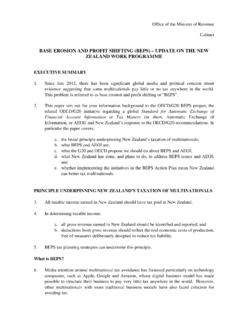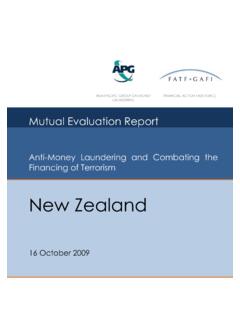Transcription of Addressing hybrid mismatch arrangements - …
1 Addressing hybrid mismatch arrangements A Government discussion document Hon Bill English Minister of Finance Hon Michael Woodhouse Minister of Revenue First published in September 2016 by Policy and Strategy, Inland Revenue, PO Box 2198, Wellington 6140. Addressing hybrid mismatch arrangements A Government discussion document. ISBN 978-0-478-42436-2 CONTENTS INTRODUCTION 1 PART I Policy and principles 3 CHAPTER 1 Background 5 Historic focus on the problem of double taxation 5 The problem of double non-taxation 5 G20/OECD Action Plan 6 hybrid mismatch arrangements 6 OECD recommendations 7 Implementation of OECD recommendations 7 CHAPTER 2 hybrid mismatch arrangements 8 hybrid instruments 9 hybrid entities 12 Indirect outcomes 15 CHAPTER 3 Policy issues 16 Global impact of hybrid mismatch arrangements 16 Uptake in other countries 18 Impact of hybrid mismatch arrangements on new zealand 18 CHAPTER 4 OECD recommendations 22 hybrid mismatch rules OECD recommendations 22 Double tax agreement commentary 27 Submissions
2 On Part I 28 PART II Details of OECD recommendations 29 CHAPTER 5 hybrid financial instruments 31 Recommendation 2 31 Recommendation 1 33 Particular tax status of counterparty not relevant 34 Differences in valuation of payments not relevant 35 Timing differences 35 Taxation under other countries CFC rules 36 Application of rule to transfers of assets 37 Regulatory capital 40 Other exclusions 40 Application to new zealand 40 CHAPTER 6 Disregarded hybrid payments 47 Requirements for rule to apply 47 Dual inclusion income 48 Carry-forward of denied deductions 50 Application of CFC regimes 51 Implementation issues 51 Application to new zealand 52 CHAPTER 7 Reverse hybrids 54 Recommendation 4 55 Recommendation 5 56 Application in new zealand 56 Recommendation.
3 Information reporting 61 CHAPTER 8 Deductible hybrid payments 63 Application to new zealand 64 CHAPTER 9 Dual resident payers 66 Application to new zealand 66 DTA dual resident rule suggestion 67 CHAPTER 10 Imported mismatches 69 Non-structured imported mismatches 70 Application to new zealand 70 CHAPTER 11 Design principles, including introduction and transitional rules 72 Design and interaction 72 General rule for introduction 78 Co-ordination with other countries 79 CHAPTER 12 Key definitions 80 Financial instrument 80 Structured arrangement 80 Related persons 81 Control group 82 Payment 83 1 Introduction hybrid mismatch arrangements are one of the main base erosion and profit shifting (BEPS) strategies used by some large multinational companies to pay little or no tax anywhere in the world.
4 As such, the OECD has developed recommendations for anti- hybrid measures in its 15 point Base Erosion and Profit Shifting (BEPS) Action Plan. hybrid mismatch arrangements exploit the different ways that jurisdictions treat financial instruments and entities to create tax advantages. Because countries have different tax systems, misalignment of domestic rules is inevitable. The OECD recommendations attempt to prevent this misalignment from giving rise to unintended tax advantages. This is primarily done through the use of linking rules which change the usual tax treatment of cross-border transactions to ensure that there is no hybrid mismatch in such cases.
5 Since hybrid mismatch arrangements are not necessarily artificial or contrived, the OECD recommendations are targeted at deliberate exploitation of hybrid mismatches. To achieve this, the proposed rules generally only apply to cross-border transactions involving related parties, as well as unrelated parties if the arrangement has been deliberately structured to produce a hybrid mismatch advantage. If new zealand were to adopt the OECD anti-hybrids recommendations, the rules would apply to foreign companies doing business in new zealand as well as new zealand -owned companies doing business offshore. It is expected that most hybrid arrangements would be replaced by more straightforward (non-BEPS) cross-border financing instruments and arrangements following the implementation of the OECD recommendations in new zealand .
6 Rules to counteract hybrid mismatch arrangements have been introduced in a number of countries. Notably, Australia and the UK are in the process of implementing the OECD recommendations into their domestic law. In addition, the European Council has issued a directive requiring EU member states to introduce anti- hybrid rules (currently on an intra-EU basis but expected to include arrangements involving non-EU countries in the future). The purpose of this document is to seek comments on how the OECD recommendations could be implemented in new zealand . Final policy decisions will only be made after the consultation phase. Part I of the document describes the problem of hybrid mismatch arrangements , the case for responding to the problem, and a summary of the OECD recommendations.
7 Part II of the document explains the OECD recommendations in greater depth and discusses how they could be incorporated into new zealand law. 2 Submissions The Government seeks submissions on how the OECD recommendations should best be incorporated into new zealand law. Submissions should include a brief summary of major points and recommendations and should refer to the document s labelled submission points where applicable. They should also indicate whether it would be acceptable for Inland Revenue and Treasury officials to contact those making the submission to discuss the points raised, if required. Submissions should be made by 17 October 2016 and can be emailed to with Addressing hybrid mismatch arrangements in the subject line.
8 Alternatively, submissions may be addressed to: Addressing hybrid mismatch arrangements C/- Deputy Commissioner, Policy and Strategy Inland Revenue Department PO Box 2198 Wellington 6140 Submissions may be the subject of a request under the Official Information Act 1982, which may result in their release. The withholding of particular submissions, or parts thereof, on the grounds of privacy, or commercial sensitivity, or for any other reason, will be determined in accordance with that Act. Those making a submission who consider that there is any part of it that should properly be withheld under the Act should clearly indicate this. In addition to seeking written submissions, Inland Revenue and Treasury officials intend to discuss the issues raised in this discussion document with key interested parties.
9 3 PART I Policy and principles 4 5 CHAPTER 1 Background Historic focus on the problem of double taxation The global international tax framework reflected in international tax treaties and countries domestic tax rules recognises that income earned from cross-border activities is at risk of double taxation once in the country where it is earned (the source state) and once in the country where the entity deriving the income is resident (the residence state). Co-operation among countries regarding income taxation has been mostly concerned with this risk of double taxation when an item of income is taxed under the domestic law of both the source and residence states and its harmful effects on cross-border trade and investment.
10 The principal focus of international tax treaties has been on eliminating double taxation through allocating taxing rights over cross-border income between the residence and source states. The problem of double non-taxation Since late 2012, there has been growing awareness that the combination of different domestic tax rules and tax planning allows multinationals to pay little or no tax on their income anywhere in the world, if they choose to do so. This so-called double non-taxation (or less than single taxation) raises a number of tax policy issues. Many of the issues raised, such as distortionary effects and competitive concerns, are similar to those raised by double taxation.




